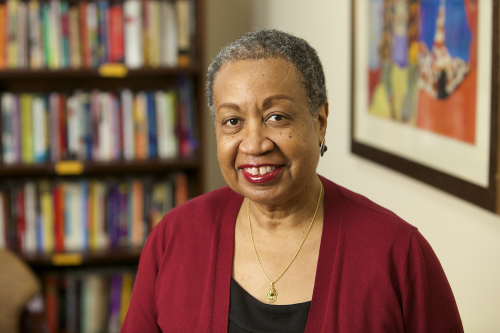May 01, 2014
Black diaspora is focus of scholarly forum at DePaul
Black diaspora is focus of scholarly forum at DePaul
CHICAGO — New directions in the study of the African and black diaspora will be the focus of an academic colloquium at DePaul University on May 9. Many universities that offer degree programs in this discipline, including DePaul, pay specific attention to the ways in which concepts of history, power, identity, gender and race shape contemporary understandings of Africa and its diaspora.
“African and black diaspora is a vibrant field of study,” said Sandra Jackson, director of DePaul’s Center for Black Diaspora. “Universities around the country are now offering advanced degree programs and there is more emphasis put on program growth and research, which is critical to helping preserve and study black and African history.”
This academic field is significant, she added, because it gives historical context and value to the movement of people from Africa to other parts of the world.
Scholars, including Jean Muteba Rahier from Florida International University and Rita Kiki Edozie from Michigan State University, will examine current research topics and academic programs in the field with an emphasis on mapping out ways to advance the discipline.
“We see the future for African and black diaspora studies and know that it is invigorated and ready for change and development. Our hope is this colloquium will stimulate conversation in the world of higher education and show other universities the importance of offering advanced degree programs in this field of study,” Jackson said.
“The future of the field also depends on the younger generation becoming interested in black diaspora studies. Our discussion aims to bring new ideas into play on how to encourage high school students to consider majoring in African and black diaspora studies; it is absolutely critical to the survival and growth of the field,” she said.
DePaul's Center for Black Diaspora, which is housed in the College of Liberal Arts and Social Sciences, was established in 1993 as the Center for African American Research. The name was changed in 1996 to expand the scope of the Center’s work. Jackson advocated refocusing the center to study more than just black diaspora in the United States, and include the migration, movement, dispersal, slavery and refugee status of blacks and Africans all over the world. The colloquium coincides with the center's 20th anniversary and the 10-year anniversary of the African and Black Diaspora Studies program.
“Our center allows us to get a global and transnational perspective on black diaspora, which is the direction the field is heading. Now we can not only look at African-American experiences in the U.S., but also study the global traffic of African and black culture, music, art and politics,” Jackson said.
“When we decided to host the colloquium we looked for individuals who had not only researched, published and taught in the field, but who were also administrators,” said Julie Moody-Freeman associate professor and director of DePaul’s African and Black Diaspora Studies program. “We were very conscious of who we invited to make sure other regions besides North America were represented at the colloquium.”
The invited speakers are professors or department chairs in the fields of black diaspora, Africana studies and African-American studies.
They include: Kimberly N. Brown, Virginia Commonwealth University; Carolyn Cooper, University of West Indies, Mona, Jamaica; Carole Boyce Davies, Cornell University; Chapurukha Kusimba, American University; Erik McDuffie, University of Illinois, at Urbana-Champaign.
Also, Sylvester Ogbechie, University of California, Santa Barbara; Akinwumi Ogundiran, University of North Carolina, Charlotte; Hugh Page Jr., Notre Dame; Olúfémi Táíwó, Cornell University; Elisa Joy Black, University of California, Davis; and Michelle Wright, Northwestern University.
The colloquium’s main goal is to help determine future viability of program development and the resources needed to help professors and students grow the field of African and black diaspora studies.
“When you have a community of people who can contribute ideas, it can open your mind and help to discover new ways to grow the field of African and black diaspora,” said Moody-Freeman. “This colloquium is crucial for discovery and innovation, which will help our area of study blossom as it heads into the future.”
The academic conference will be held May 9 at the DePaul Art Museum, 935 W. Fullerton Ave. in Lincoln Park. The program begins at 10 a.m. and continues through 6 p.m.
“I enjoy working collaboratively and this colloquium provides our center the opportunity to see what is being done outside of our program,” said Jackson. “By including professors and scholars it gives DePaul the opportunity to learn from other institutions of higher education and the chance to show our own growth in the field.”
More information about the colloquium and DePaul’s Center for Black Diaspora is available at http://las.depaul.edu/diaspora.
###
SOURCE:
Sandra Jackson
sjackson@depaul.edu
773-325-7990

Sandra Jackson, director of the Center for Black Diaspora, will look at ways to grow the field of African and black diaspora studies during an international colloquium on May 9 at DePaul University. (Photo by Jon Cecero)
